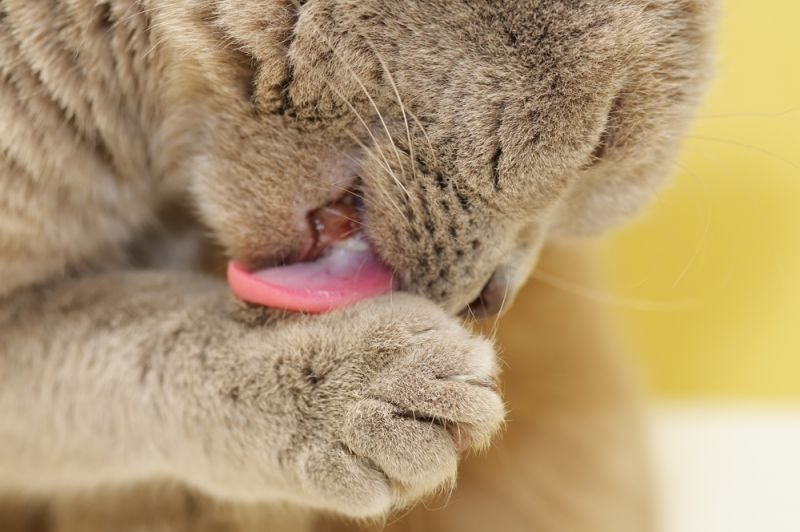
What are hairballs?
A hairball is a small collection of hair or fur that forms in the stomach of a cat. Cats ingest the hair while grooming themselves. Hairballs are expelled from the stomach by means of vomiting. They are often cylindrical in shape and can include bits of food and other debris along with the densely packed fur.
Why does my cat get them?
Grooming is very important to cats – they spend a large portion of the day cleaning themselves. There are a number of reasons for this including removing strange odors that could attract predators, helping them cool down on a warm day, fur maintenance, stimulating blood flow, and of course, it’s quite relaxing! In the process, the cat’s tongue (covered with backward facing barbs called papillae) collects dirt, debris, and loose hair from its coat. While some hair passes through the digestive tract without incidence, some hair may stay and collect in the stomach or small intestine. As the hair collects it forms a hairball. Usually this is the point your cat will begin to gag and retch in order to expel the buildup.
What are the symptoms?
It is a common sight and sound to most cat lovers – their cat hunched over, head down, while making an awful sounding hacking, gagging, retching sound. This usually precedes the vomiting up of a hairball. Cats can sometimes vomit food or bile before eventually vomiting up the hairball. Other symptoms that can sometimes accompany hairballs are a decreased appetite and constipation.
Are they harmful?
While it is rare, hairballs can sometimes cause life-threatening blockages or be indicators of an underlying illness such as inflammatory bowel disease or cancer. Signs and symptoms to watch for include:
- If your cat is showing the classic hairball symptoms of hacking, gagging, and retching on an ongoing basis but is not producing a hairball
- Frequent vomiting of hairballs
- Vomiting of hairballs combined with any of the following:
Lack of appetite
Lethargy
Constipation or diarrhea
If you notice any of these symptoms in your cat or you are concerned about the frequency of hairballs occurring, schedule an appointment with your veterinarian as soon as possible.
How can I prevent them?
There are several ways to help reduce the formation and frequency of hairballs:
Daily brushing of your cat’s coat can help decrease the amount of stray hairs ingested by your cat. This is especially important for long haired breeds that are even more prone to hairballs. However short hair cats can form hairballs as well and should not be overlooked. Brushing has the added benefits of preventing matted fur as well as being a bonding experience between you and your cat.
There are over the counter oral lubricants that can assist the passage of accumulated hair through your cat’s digestive tract. Ask your veterinarian if one of these products is right for your cat.
If your cat has frequent hairballs and your veterinarian has ruled out other conditions, they may recommend a special formulated diet that helps reduce hairballs. Always check with your veterinarian first before deciding on a specially formulated diet for your cat.
Tags: cats, kitty korner, hairballs, pet health







